- +65 6738 1616
- +65 8123 1214
- info@drbarrietan.com
Home > ENT Services > Cochlear Implant Surgery by Specialist Doctor Barrie Tan
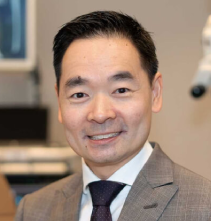
A cochlear implant is an advanced hearing device designed to assist individuals with severe or profound hearing loss. It is often considered when hearing aids no longer provide sufficient benefit, helping users better detect and interpret sounds in everyday situations. This form of surgery can potentially benefit a wide range of patients, from infants born with hearing loss to older adults; however, this is dependent on their medical evaluation and hearing condition.
In Singapore, a cochlear implant surgery is performed by an ENT specialist doctor trained in managing complex hearing conditions. To understand how cochlear implants help, it is important to first consider the nature of sensorineural hearing loss. This type of hearing loss occurs when the cochlea, the inner-ear organ responsible for detecting sound, is damaged and cannot effectively stimulate the auditory nerve. As a result, sound signals fail to reach the brain, leading to significant hearing difficulties. A cochlear implant addresses this by bypassing the damaged parts of the cochlea and transmitting sound information directly to the auditory nerve.
This advanced technology offers a different way for the brain to receive and interpret sound, supporting improved hearing perception for suitable candidates. In the next section, we will explain how a cochlear implant works and the process involved in greater detail.
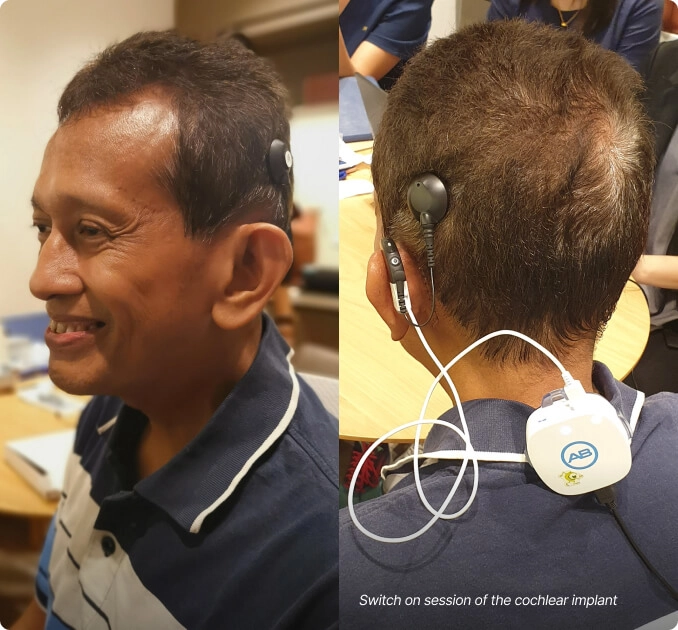
As mentioned earlier, a cochlear implant enables hearing through an electronic system that replaces the ear’s natural process of converting sound into nerve signals. Instead of relying on the damaged structures of the inner ear, the device captures sound from the environment and transforms it into electrical signals that the brain can interpret.
This sequence involves several components working together in a continuous pathway from sound detection to brain interpretation. Each part contributes a specific function within the system, ensuring that sound is accurately processed and transmitted. The main components of a cochlear implant are as follows:
The external parts of a cochlear implant are responsible for capturing and processing sound before sending it to the internal system. These components work together to begin the hearing process by detecting, analysing, and transmitting sound information from the environment.
Microphone
The process begins with a small microphone located on the external device, typically worn behind the ear. It picks up sounds from the environment and sends them to the sound processor.
Sound Processor
The sound processor analyses the captured sounds and converts them into digital signals. It filters and organises the sound information, preparing it for transmission to the internal part of the implant.
Transmitter Coil
The transmitter coil sends the processed digital signals across the skin using radio frequency to reach the internal receiver. This enables the implant’s internal components to receive the sound information for further processing.
The internal parts of a cochlear implant work together with the external system to deliver sound information to the auditory nerve. They receive and process the digital signals transmitted through the skin and convert them into electrical impulses that the brain can interpret as sound.
Receiver/Stimulator
Positioned just beneath the skin behind the ear, the implanted receiver/stimulator receives signals from the external transmitter coil. It converts these digital signals into precise electrical impulses for transmission to the electrode array.
Electrode Array
A thin, flexible electrode array is surgically inserted into the cochlea. It carries the electrical impulses generated by the receiver and delivers them to specific regions within the cochlea. Each electrode stimulates different nerve fibres according to pitch and frequency, closely replicating the ear’s natural hearing pattern.

A cochlear implant surgery is a carefully planned procedure performed by an experienced ENT specialist doctor. It is typically recommended for individuals whose hearing loss no longer improves with hearing aids. Choosing to proceed with surgery is not only a medical decision but also an acknowledgment of the broader cost of hearing loss, which can affect communication, social connection, and overall well-being.
The operation is performed under general anaesthesia to ensure the patient remains asleep and comfortable. The surgeon begins by making a small incision behind the ear to access the mastoid bone and removes a section to create a pathway to the middle ear and cochlea. A small opening, known as a cochleostomy, is then made in the cochlea, or the round window membrane is used as the entry point. The electrode array is then gently inserted through this opening into the cochlea.
After the electrode array is positioned, the internal receiver and stimulator are placed beneath the skin behind the ear and secured in a shallow recess within the skull bone. The incisions are closed with sutures, and a protective bandage is applied to aid healing. Although the surgery requires precision and expertise, its greater purpose is to restore access to sound and lessen the unseen cost of untreated hearing loss over time.
In Singapore, medical and surgical standards are among the highest in the region, and cochlear implant surgery is performed with precision and care by qualified specialists. However, as with any surgical procedure, some degree of risk remains. Understanding these possibilities helps patients make informed decisions with their cochlear implant surgeon and medical team. In most cases, complications are uncommon, especially when the surgery is carried out by an experienced ENT specialist. Before proceeding, the doctor will first explain these potential risks and discuss them with the patient as part of the consultation and surgical planning process.
Device Failure
In rare cases, one of the implant’s internal or external components might malfunction and require repair or replacement.
Electrode Displacement
Over time, the electrode array inside the cochlea might shift slightly from its original position, which can affect sound perception.
Facial Nerve Injury
Because the facial nerve runs close to the area of implantation, there is a slight risk of nerve irritation or injury during surgery.
Infection
A small risk of infection exists at the incision site following surgery. Proper wound care and antibiotics are used to minimise this risk.
Meningitis
There is a very small risk of meningitis, an infection affecting the membranes that surround the brain and spinal cord. Preventive measures, including vaccination and antibiotics when appropriate, help to reduce this risk.
Otitis Media
An infection in the middle ear, known as otitis media, might occasionally occur after surgery. This condition can cause ear discomfort or fluid buildup but is usually manageable with medication and follow-up care. Persistent middle ear infections might slightly increase the risk of more serious infections such as meningitis.
Residual Hearing Loss
Some patients may lose any remaining natural hearing in the implanted ear following surgery.
Skin Irritation
If not fitted correctly, the external parts of the cochlear implant might cause mild skin irritation at the point of contact.
Tinnitus
Some patients might experience or notice increased tinnitus, or ringing in the ears, after surgery.
Vertigo or Balance
Disturbance
Because the inner ear contributes to balance, some patients might experience temporary vertigo or mild balance disturbance after the operation. These effects usually resolve as the body adapts during recovery.
Although complications are uncommon, awareness of these risks helps patients better understand the procedure and work closely with their ENT specialist to ensure proper care before and after their cochlear implant surgery.
Cochlear implants are recognised as a safe and well-established surgery procedure for children with severe to profound hearing loss. The procedure is performed by trained ENT specialists using advanced techniques that meet high medical standards of care. For children who do not benefit from hearing aids, it provides an effective way to access sound and engage more fully with the world around them.
With ongoing advancements in medical technology, bilateral implantation, where cochlear implants are placed in both ears during the same surgery, has become increasingly common. This approach might be suitable even for children as young as one, but it is also dependent on the individual’s medical assessment and overall suitability. Bilateral hearing offers better sound localisation and balance, helping children adapt more naturally to their listening environment.
When the surgery is performed early in life, a paediatric cochlear implant takes advantage of the brain’s natural adaptability. This allows children to process sound efficiently and develop clearer speech and communication skills. Over time, consistent hearing input supports language learning, confidence, and active participation in both school and social settings.
Beyond childhood, cochlear implants also offer significant benefits for adults with acquired or age-related hearing loss. In Singapore, Dr Barrie Tan has successfully performed cochlear implant surgeries on elderly patients, demonstrating that improved hearing and a more fulfilling quality of life can be achieved at almost any age.
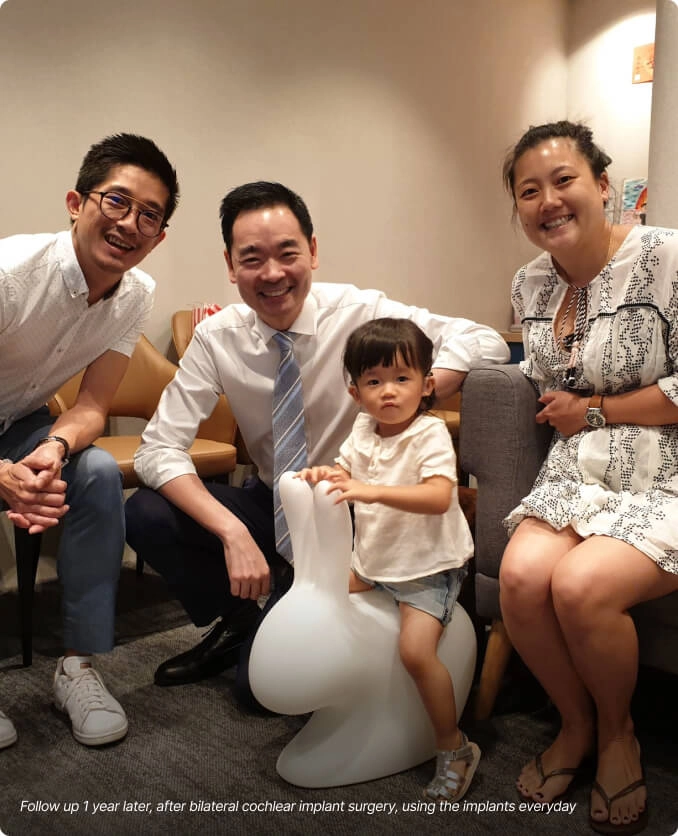
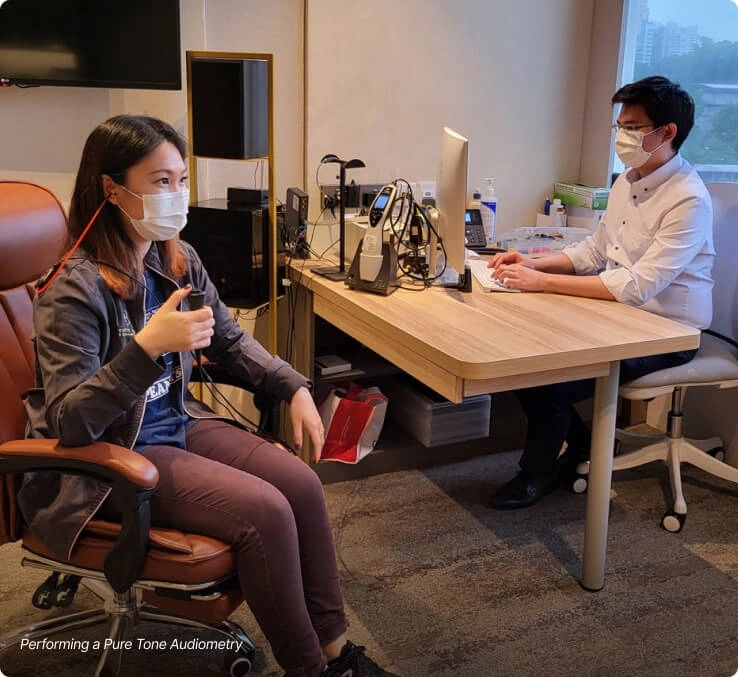
At the Barrie Tan ENT Head & Neck Surgery centre, every specialist consultation begins with understanding your needs and goals. Led by Dr Barrie Tan, one of Singapore’s most experienced cochlear implant surgeons and former Director of the Centre for Hearing and Ear Implants at the Singapore General Hospital (SGH), our ENT specialist clinic combines expertise with genuine compassion to deliver personalised, high-quality care.
Drawing on his experience performing hundreds of cochlear implant surgeries, Dr Barrie Tan is widely recognised for his expertise in Singapore and across Southeast Asia, where he continues to mentor and support fellow surgeons. Together with a dedicated team of cochlear implant audiologists, auditory verbal therapists, and nurses, Dr Barrie Tan provides clear guidance and continuous support through every stage of your treatment, from assessment and surgery to post-implant care and rehabilitation. Contact us today to arrange a for consultation and discover how cochlear implants can help you regain better hearing, clearer communication, and renewed confidence.
Read Dr Tan’s insights on cochlear implant surgery in children in this Gleneagles Hospital article: https://www.gleneagles.com.sg/health-plus/article/cochlear-implant-surgery
Read Dr Tan’s views on cochlear implants for severe hearing loss on this HealthXchange-SingHealth article: https://www.healthxchange.sg/news/consider-cochlear-implants-severe-hearing-loss
Senior Consultant ENT Specialist
MBBS (Singapore), MMed (ENT) (Singapore)
MRCS (Edinburgh, UK), FAMS (Otolaryngology)
Dr Barrie Tan is an experienced ENT specialist with over 20 years of clinical experience and subspecialised expertise in hearing loss and cochlear implants. Before establishing his own clinic practice, the Barrie Tan ENT Head & Neck Surgery centre, he served as Head of the ENT Department at SGH, the largest ENT department in Singapore, and as Director of the Centre for Hearing and Ear Implants at SGH.
A President’s Scholar, Dr Barrie Tan completed his subspecialty Fellowship in Otology, Hearing Implant, Neurotology, and Skull Base Surgery at the Ear Science Institute in Australia. He remains actively involved in the ENT community through various leadership roles, and is committed to nurturing the next generation of ENT surgeons. In addition to organising numerous ENT conferences, Dr Barrie Tan continues to contribute his time and expertise to volunteer work and medical missions.
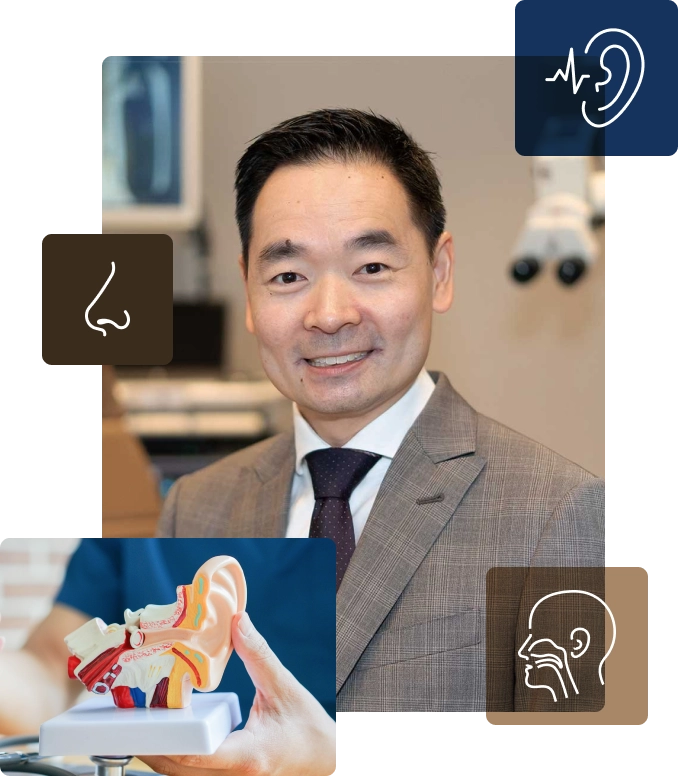
A cochlear implant is a medical device that helps individuals with severe hearing loss by bypassing damaged parts of the inner ear and directly stimulating the auditory nerve. It has two main parts: an internal receiver-stimulator placed under the skin and an external speech processor worn behind the ear to capture and transmit sound.
A cochlear implant works by capturing sound through a small external microphone behind the ear. The sound is processed and sent to an internal receiver, which converts it into electrical signals. These signals travel through electrodes placed in the cochlea, stimulating the auditory nerve to transmit sound information to the brain.
A cochlear implant restores hearing in individuals with severe to profound hearing loss, allowing clearer communication and improved safety. In children, early implantation supports speech and language development. It also enhances awareness of sound direction and surroundings, helping users stay engaged with family, friends, and society, which improves overall quality of life.
Cochlear implant preparation includes a full evaluation by an ENT specialist to determine suitability, which will involve hearing tests and imaging. The doctor will explain the surgery procedure, possible risks, and recovery expectations. Understanding post-surgery care and involving a family member in rehabilitation can help ensure a smoother adjustment and better long-term outcomes.
Cochlear implant surgery is performed under general anaesthesia and typically takes two to four hours. During surgery, the surgeon first makes an incision behind the ear, places the implant, and inserts the electrode into the cochlea. After closing the incision, a head bandage is applied. Most patients stay overnight, with the bandage removed before discharge.